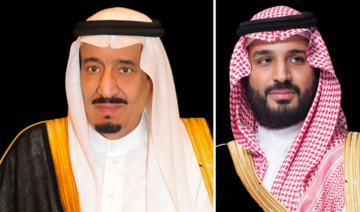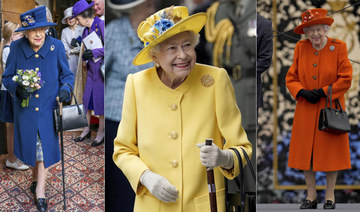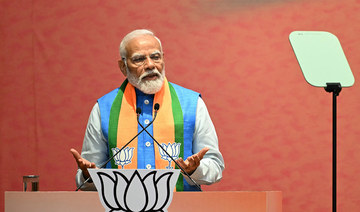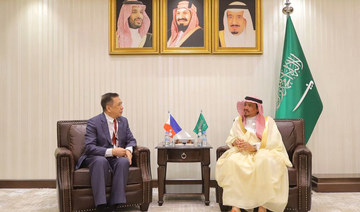LONDON: Britons prepared Wednesday to mark a record-breaking 70 years on the throne for Queen Elizabeth II, with four days of festivities offering temporary respite from an inflationary crisis and doubts over the monarchy’s future.
The Platinum Jubilee takes place as Britons contend with a surge in prices not seen since the 1970s, with many households struggling to put food on the table and pay rocketing bills.
But with two public holidays from Thursday and then the weekend, pubs, restaurants and retailers are hoping for a timely sales boost, after a difficult period including the Covid pandemic.
Supermarket chain Co-op predicted “a bigger sales period than Christmas.”
On The Mall, a red-paved avenue leading to Buckingham Palace, royal enthusiasts from far and wide have been camping out, despite heavy downpours.
“The last 24 hours have been horrendous. We had rain, hail, thunder, lightning,” Mary-Jane Willows, 68, from Cornwall, southwest England, told AFP.
“It’s the only way to make sure that you are at the front of the barrier when that royal coronation coach goes past, that golden coach.... It will be the most magical moment,” she said.
Angie Hart, 51, traveled from Canada to stake out a camping spot on The Mall with her husband and two daughters.
“It has always been something that I wanted to do,” she said. “I just have a real respect for the queen.”
But in Britain and the wider Commonwealth, support for the monarchy overall is an open question once the increasingly frail, 96-year-old monarch departs the scene.
With Prince Charles taking over more of his mother’s duties for occasions of state, there is a sense that the first — and possibly the last — Platinum Jubilee in British history marks a turning of the page.
A poll for The Sun newspaper this week gave the queen a 91.7-percent approval rating. Charles commanded only 67.5 percent, behind his son Prince William on 87.4 percent.
In Australia, where the queen is also head of state, new center-left Prime Minister Anthony Albanese appointed an “assistant minister for the republic” in a move welcomed by the republicans.
Albanese has previously described Australia becoming a republic as “inevitable.”
Historian Anthony Seldon, of the London School of Economics and Political Science (LSE), said “how traumatic it’s going to be when it unravels, as well as it might in the next two, three, four years when the change comes.”
Unlike the vocal Charles, the queen has rarely expressed an opinion in public, and her sheer longevity means that she has been a fixture of the life of nearly every Briton alive.
She has overcome numerous family traumas, including Charles’ very public split from Princess Diana and personal heartache when her consort Prince Philip died aged 99 last year.
The jubilee is being seen as a chance for the nation to give thanks to the queen publicly, after social distancing last year prevented crowds at Philip’s funeral.
The celebrations kick off Thursday with Trooping the Color, a military parade that has officially marked the British monarch’s birthday for centuries.
A fly-past will include Spitfires, the iconic fighter plane that helped win the Battle of Britain and fend off Nazi Germany in 1940.
The aerial display is expected to be watched by the queen and senior royals from the balcony of Buckingham Palace.
Balcony numbers have been limited to “working royals” only, leaving no place for self-exiled grandson Prince Harry and his American wife Meghan — returning on a rare visit to Britain — nor Elizabeth’s disgraced second son Prince Andrew.
Patriotic nostalgia runs red, white and blue throughout the festivities, culminating in Ed Sheeran singing “God Save the Queen” in front of Buckingham Palace on Sunday.
Participants in a giant public parade through central London earlier Sunday will be familiar to anyone acquainted with British popular culture since 1952.
But Bollywood dancers and a Caribbean carnival will also reflect the changes in British society since then, from one that was predominantly white and Christian, to one that is multicultural and multi-faith.
Britain’s Empire has given way to a Commonwealth of nations — 14 of which still count the queen as their head of state, including Australia and Canada.
But recent royal tours of the Caribbean have laid bare growing tensions about the British monarchy’s status further afield.
“This queen has been a significant glue within that Commonwealth,” said Michael Cox, emeritus professor of international relations at LSE.
“Whether, how successfully, Charles is going to play the same role, I don’t know,” he said.
UK overlooks crisis to celebrate queen’s jubilee
https://arab.news/nr3t6
UK overlooks crisis to celebrate queen’s jubilee
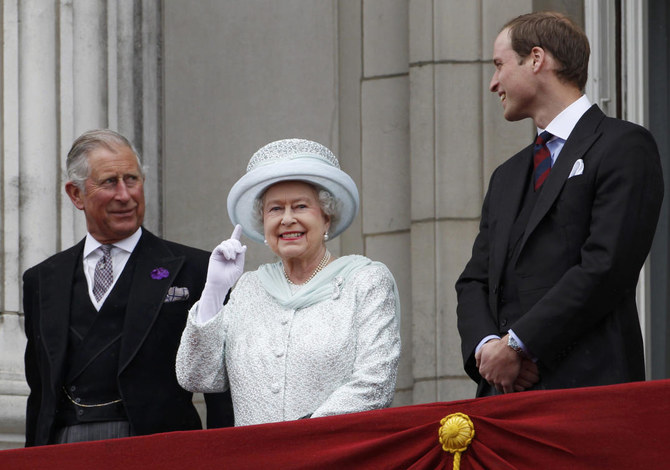
- The Platinum Jubilee takes place as Britons contend with a surge in prices not seen since the 1970s
- With two public holidays from Thursday and then the weekend, pubs, restaurants and retailers are hoping for a timely sales boost
Top Biden official doubts Israel can achieve ‘total victory’ in Gaza

- Israel has killed more than 35,000 Palestinians, according to Gaza’s Health Ministry
WASHINGTON: The Biden administration does not see it likely or possible that Israel will achieve “total victory” in defeating Hamas in the Palestinian enclave of Gaza, US Deputy Secretary of State Kurt Campbell said on Monday.
While US officials have urged Israel to help devise a clear plan for the governance post-war Gaza, Campbell’s comments are the clearest to date from a top US official effectively admitting that Israel’s current military strategy won’t bring the result that it is aiming for.
“In some respects, we are struggling over what the theory of victory is,” Campbell said at a NATO Youth Summit in Miami. “Sometimes when we listen closely to Israeli leaders, they talk about mostly the idea of....a sweeping victory on the battlefield, total victory,” he said.
“I don’t think we believe that that is likely or possible and that this looks a lot like situations that we found ourselves in after 9/11, where, after civilian populations had been moved and lots of violence that...the insurrections continue.”
Israeli Prime Minister Benjamin Netanyahu has repeatedly vowed to achieve “total victory” against Hamas, the Palestinian militant group that attacked Israel on Oct. 7 and killed 1,200 people and took 250 others hostage.
In response, Israel unleashed a relentless assault on the Gaza Strip, killing more than 35,000 people, according to the figures of the Gazan health ministry, and reducing the densely populated tiny enclave to a wasteland.
Campbell’s comments come as Washington is warning Israel not to go ahead with a major military offensive in Rafah, the southernmost city of the Gaza Strip where over a million people who have already been displaced by Israeli attacks are taking shelter.
Likening the situation in Gaza to that of a recurring insurgency that the United States faced in Afghanistan and Iraq after its invasions there following the Sept. 11 attacks, Campbell said a political solution was required.
“I think we view that there has to be more of a political solution...What’s different from the past in that sense, many countries want to move toward a political solution in which the rights of Palestinians are more respected,” he said.
“I don’t think it’s ever been more difficult than right now,” he added.
Police aim to break up pro-Palestine protests in Amsterdam

- The Eindhoven University of Technology confirmed that there were “dozens of students peacefully protesting outside next to ten to 15 tents”
AMSTERDAM: Police moved in to end a pro-Palestinian protest at the University of Amsterdam on Monday after protesters occupied university buildings in various Dutch cities to condemn Israel’s war in Gaza, ANP news agency reported.
Earlier on Monday, a Dutch protest group said it had occupied university buildings in the Dutch cities of Amsterdam, Groningen and Eindhoven.
In a post on social media site X, Amsterdam police said the university had filed a police report against the protesters for acts of vandalism.
Police made sure no one entered the university buildings and asked protesters to leave the premises voluntarily.
A spokesperson for the University of Amsterdam confirmed the occupation and said it had advised people not affiliated with the protest to leave the building.
The Eindhoven University of Technology confirmed that there were “dozens of students peacefully protesting outside next to ten to 15 tents.”
Students in the Netherlands have been protesting against Israel’s war in Gaza since last Monday and Dutch riot police had previously clashed with protesters at the University of Amsterdam.
Students in the US and Europe have also been holding mostly peaceful demonstrations calling for an immediate permanent ceasefire and for schools to cut financial ties with companies they say are profiting from the oppression of Palestinians.
Ukraine’s first lady and foreign minister visit Russia-friendly Serbia

- Although Serbia has condemned the Russian aggression on Ukraine, it has refused to join international sanctions against Moscow
BELGRADE, Serbia: Ukrainian Foreign Minister Dmytro Kuleba made a surprise visit to Russia-friendly Serbia on Monday, together with Ukraine’s first lady, Olena Zelenska, in a sign of warming relations between the two states.
On his first visit to Serbia since the start of the Russian aggression on Ukraine in 2022, Kuleba met Serbian President Aleksandar Vucic and new Serbian Prime Minister Milos Vucevic, whose government includes several pro-Russian ministers, including two who have been under US sanctions.
A statement issued by the prime minister’s office after the talks said that “Serbia is committed to respecting international law and the territorial integrity of every member state of the United Nations, including Ukraine.”
Although Serbia has condemned the Russian aggression on Ukraine, it has refused to join international sanctions against Moscow and has instead maintained warm and friendly relations with its traditional Slavic ally.
Serbia has proclaimed neutrality regarding the war in Ukraine, and its authorities repeat that Serbia does not supply weapons to any parties. However, there are reports that Serbia has delivered weapons to Ukraine through intermediary countries. The visit by Kuleba and Zelenska, who toured the Serbian capital with Serbian first lady Tamara Vucic on Sunday, was met with criticism in Moscow. Comments by readers in the Russian state-run media such as “shameful” were published by RIA Novosti.
In what appears to be damage control, soon after his talks with Kuleba on Monday, Vucevic was to meet the Russian ambassador to Belgrade and the two were to tour a big storage facility for Russian gas that is being imported to Serbia.
Pro-Russian President Vucic has informally met Ukrainian President Volodymyr Zelenskyy three times on the sidelines of international conferences. Serbia has supplied Ukraine with humanitarian and financial aid.
Vucic has for years claimed to follow a “neutral” policy, balancing ties among Moscow, Beijing, Brussels and Washington. Although he has repeatedly said that Serbia is firm on its proclaimed goal of seeking European Union membership, under his authoritarian rule the Balkan country appears to be shifting closer to Russia and especially China.
During a high-stakes visit by Chinese President Xi Jinping to Belgrade last week, China and Serbia signed an agreement to build “ironclad” relations and a “shared joint future.”
Modi’s BJP skips Kashmir as Indian election enters fourth phase

- Millions of Indians across 96 constituencies began voting on Monday
- Ruling party is not fighting elections in Kashmir for first time in 30 years
NEW DELHI: India’s ruling Bharatiya Janata Party is not contesting elections in the Muslim-majority region of Kashmir for the first time in nearly three decades, as voting in the latest round of the national polls got underway on Monday.
The world’s most populous country began voting on April 19 in a seven-phase election that is scheduled to take place over six weeks, with ballots set to be counted on June 4.
India has 968 million people eligible to vote in the general election, where incumbent Prime Minister Narendra Modi and his Hindu nationalist BJP are aiming for a rare third consecutive term in power.
Monday’s voting involved 96 constituencies in the fourth round of polling.
While the BJP, which has been in power since 2014, and its allies are contesting every other part of India as they look to secure a majority of the 543 parliamentary seats, the party is sitting out in the northern Himalayan territory of Jammu and Kashmir.
This year marks the region’s first election since Modi’s government stripped the valley of its special autonomous status and statehood — which was granted by the Indian Constitution — on Aug. 5, 2019. The move unilaterally revoked the relevant provisions under Article 370, scrapping Kashmir’s flag, legislature, protections on land ownership and fundamental rights, sparking fears of demographic engineering in the region.
“It’s really surprising that the BJP, which claimed to have over 800,000 cadres in the valley, failed to find a single candidate. It shows that the BJP is not popular in the valley,” Sanjay Tickoo, the Srinagar-based leader of the Hindu minority group Kashmiri Pandit, told Arab News.
“I am expecting a record turnout to show the central government what (they) have done to the people of Jammu and Kashmir. This is the reflection of anger … no one is happy in the valley after the abrogation of Article 370.”
Indian-controlled Jammu and Kashmir is part of the larger Kashmiri territory, which has been the subject of international dispute since the 1947 partition of the Indian subcontinent into Hindu-majority India and Muslim-majority Pakistan. Both countries claim Kashmir in full and rule in part.
Modi said his government had been focusing on jobs and development as part of an effort to end violence in the valley, which has for decades witnessed outbreaks of separatist insurgencies to resist control from the government in New Delhi.
But after the BJP lost Kashmir’s three seats in the 2019 election, the party’s popularity slid further after it revoked the region’s autonomous status later the same year and subsequently imposed months of strict communication blockade and jailed hundreds of political leaders.
“The vote expresses not only anger but also apprehension against the anti-Muslim rants that have been going on as well as whatever they have done in Kashmir,” Professor Sheikh Showkat, a Srinagar-based political analyst, told Arab News.
Altaf Thakur, BJP spokesperson in Kashmir, said the party was still taking part in the Kashmir polls by supporting other regional parties.
“It is not correct to say that we are not fighting the election, we are playing the role of kingmaker and whichever way the cadres of the BJP will go, we will win,” he told Arab News.
“It’s not important whether we stand in the elections or not, the important thing is that we have to defeat the dynasty rulers,” he said, referring to the main contenders in the Kashmir polls, the National Conference and People’s Democratic Party.
While they are fighting each other in the valley, both parties have said they oppose the BJP and are part of the Congress party-led opposition alliance, known as India.
For some Kashmiri voters, Monday’s vote was about speaking up for themselves.
“The BJP knew that they cannot tolerate the wrath of the people of Kashmir. They fled the contest without a fight,” Aijaz Ahmed, a businessman from Srinagar, told Arab News.
“I voted today because it gave me an opportunity to express myself and tell the government in Delhi that you cannot keep us silenced. We want an atmosphere without fear and a region where our own identity is not questioned.”
5,000 Filipino pilgrims expected to fly to Makkah for Hajj

- Travelers ‘can expect VIP-like treatment,’ National Commission on Muslim Filipinos says
- First pilgrims will take off from Manila International Airport next week
MANILA: Thousands of Filipino pilgrims are set to travel to Makkah for the upcoming Hajj pilgrimage, the National Commission on Muslim Filipinos said on Monday, with the first batch set to leave for Saudi Arabia next week.
In the predominantly Catholic Philippines, Muslims constitute about 10 percent of the nearly 120 million population. Most live on the island of Mindanao and the Sulu archipelago in the country’s south, as well as in the central-western province of Palawan.
The commission said that nearly 5,000 Muslims had confirmed they would travel to Saudi Arabia to perform the Hajj pilgrimage this year.
“We have already processed 96 percent of the pilgrims,” Zainoden Usudan, chief of Hajj operations at the NCMF’s Bureau of Pilgrimage and Endowment, said.
“They can expect VIP-like treatment, allowing them to fully concentrate on their pilgrimage.”
Officials from the commission have been working hard to ensure that the difficulties faced by pilgrims last year will not be a problem this time around.
“This time, we are making sure that food will not be a problem,” Usudan said, referring to problems with delayed meal deliveries in 2023.
He said the commission was working with a service provider in the Kingdom that had contingency plans for all aspects of the trip, including transportation.
The first Hajj flight from the Philippines is set to take off from Manila International Airport on May 23.
One of the five pillars of Islam, this year’s Hajj is expected to run from June 14-19. Many pilgrims extend their stays to make the most of the once-in-a-lifetime opportunity to fulfill their religious duty.








